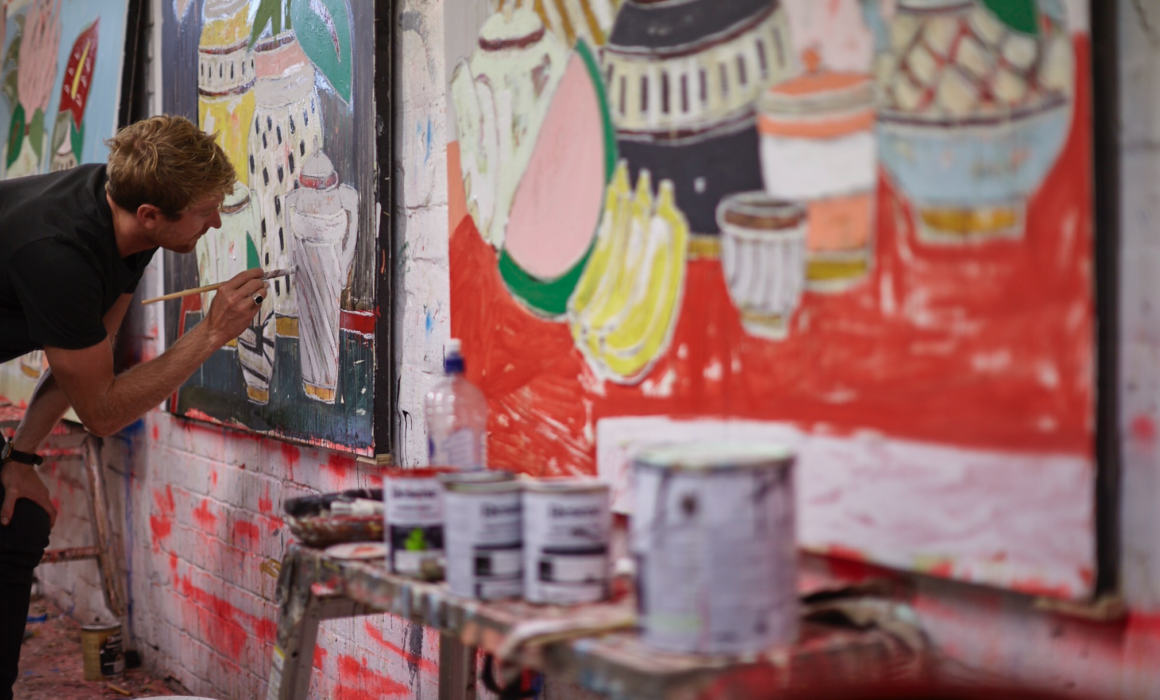Rob Tucker in Conversation with Sarah Forman

The #LockdownEditions are a Delphian-run initiative to support some of our favourite contemporary artists during these difficult and unprecedented times. Throughout the remainder of the quarantine measures, we will be releasing a new print each week, with all of the profits going directly to the artists themselves. This week, we’re excited to feature our seventh artist, Rob Tucker, to talk about mark making, flattening the curve, and picking problematic works
Sarah Forman: Tell us a bit about yourself and your practice.
Rob Tucker: I’m a New Zealand based painter who forged an abstract style at a young age. I look to capture my subject matter in a naive and raw manner – built through heavy-handed mark making and expressive painterly application. Mark making, to me, is a tangible portrayal of instinct, like a way to illustrate a feeling without literal reference. I can lose myself in an act of application to create something that feels like pure freedom.
I predominately work with paint, which in my application plays a strong sculptural role, constructing and deconstructing layers. Although I do paint still lifes, accurately depicting subject matter has never been my focus. It’s just a vehicle for me to explore mark making in an expressive and kind of imaginary cartoon like approach.
SF: Where are you based and how has the current global health crisis affected your day-to-day?
RT: I am based in Auckland working out of a studio in a converted power station building. I feel incredibly lucky to live in a very small country surrounded by ocean, so we haven’t been as affected as others. However, like everyone, the general uncertainty of the moment and how quickly things are evolving is rather unsettling and sometimes really unmotivating.
Some of my planned exhibitions in Miami and Paris were halted to ensuring people’s health and wellbeing, uncertain economies and lockdown restrictions. However, in other countries that had the virus earlier and already flattened the curve, I’ve been able to continue sending work for showcase, like in Hong Kong and Singapore.
SF: In what ways have you changed how you work and/or what you’re working on?
RT: I’m generally very busy with my painting, which means I’ve had little time to stop and experiment. The main ramification of the crisis, for my work, has actually been really positive. I’ve slowed down, focused my energy on reflection and evolving my current practice. I’m working on a new body of work for a solo exhibition in September with Piermarq, an Australian based gallery. This series will have a focus on interior and architectural themes, expressed through my heavy mark-making and painterly processes.
SF: How have you seen your community affected by the current COVID-19 crisis? Inside and outside the art world?
RT: I’m proud of how our government handled the situation by coming in hot and early, shutting the borders and essentially locking the country down for one month. Because of this decision, businesses are starting to go back to work. It’s interesting to see how rapidly the art industry is reacting – driving new ways of collaborating and using e-commerce to continue things in a whole new world. While it will never be the same as standing in front of a painting in the flesh, it’s exciting to see creatives pushing the boundaries of artistic traditions, coming together as a community, and using online tools they have available to the best of their ability.
SF: Can you talk to us a little bit about this print and why you chose it?
RT: To much of my delight the team at Delphian chose the work they wanted to print. I was actually surprised with their selection as it’s not one of my favourites. It was a challenging and problematic work whilst I was painting it. But interestingly, I’ve had a lot of positive feedback from it, so that’s always nice to hear.
SF: Do you feel there’s a certain pressure to respond to what’s going on in the world right now? If so, what does that look like?
RT: There is definitely pressure to progress my work creatively, continue showing abroad despite the current crisis, and be active on social media supporting online communities. I feel creatives are needed more than ever to bring vibrancy and colour in dark times of real uncertainty. We are all human and in this together, and to bringing people enjoyment and pleasure is a great honour.
SF: Have you seen initiatives taking place that really scare you? Excite you?
RT: To be honest, the print release with Delphian Gallery is the most impressive, quick-fire initiative that tangibly helps artists and spreads awareness that creative industries have taken a direct hit. Really proud and excited to be working with such a forward-thinking artist run gallery and have a print that is accessible to art enthusiasts on a global stage.
For more conversations
Moley Talhaoui in conversation
Lucia Ferrari in Conversation
Sunyoung Hwang in conversation
Matt Macken in conversation
Igor Moritz in conversation
B.D. Graft in conversation
For more from Rob Tucker, see his INSTAGRAM

